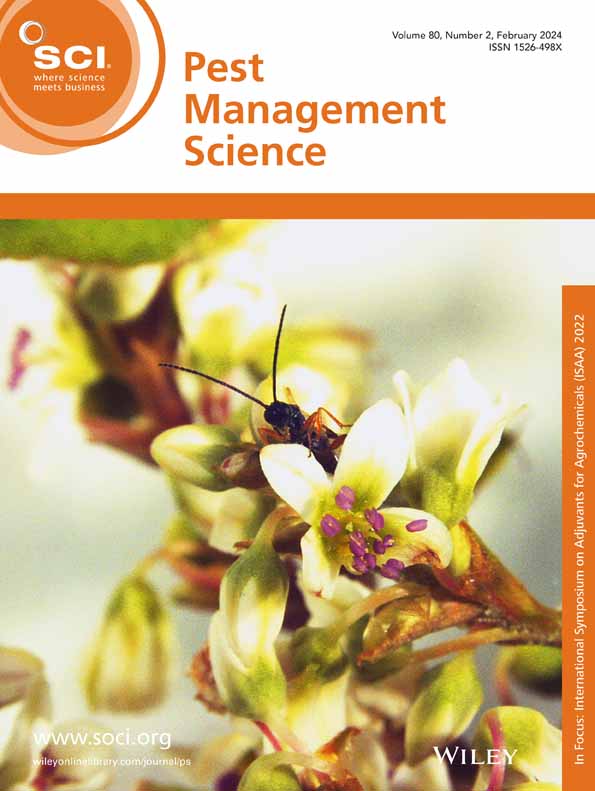velezensis JLU-55对玉米病原菌异养螟的抑菌作用机制
IF 3.8
1区 农林科学
Q1 AGRONOMY
引用次数: 0
摘要
背景南方玉米叶枯病(SCLB)是一种严重影响全球玉米生产的主要病害,特别是在热带和亚热带地区。由于环境和健康方面的考虑,化学杀菌剂和抗性品种等传统控制策略是有限的。结果本研究发现velezensis JLU-55是一种潜在的异养梭菌生物防治剂。该菌株从玉米根际分离得到,并对其拮抗活性、植物促生长特性和潜在的生物防治机制进行了系统评价。双培养实验结果表明,JLU-55对异养梭菌和其他植物病原菌(包括灰霉病菌和谷物镰刀菌)具有广谱的抑菌活性。该菌株产生多种水解酶-如纤维素酶、蛋白酶和淀粉酶-以及吲哚-3-乙酸,这些酶共同增强了其生物防治能力。此外,体内试验表明,JLU-55可显著减少玉米叶片的病变发展,有效地发挥保护和治疗作用。基因组测序鉴定出11个负责合成次生代谢物的基因簇,其中两个基因簇从JLU-55提取物中成功表征。此外,JLU-55还能诱导玉米关键抗病基因的表达,表明其具有激活宿主免疫应答的能力。结论velezensis JLU-55作为一种可持续的环境友好型生物防治剂在玉米生产系统中具有重要的应用前景。©2025化学工业协会。本文章由计算机程序翻译,如有差异,请以英文原文为准。
Antifungal mechanism of Bacillus velezensis JLU-55 against maize pathogen Cochliobolus heterostrophus.
BACKGROUND
Southern corn leaf blight (SCLB), caused by Cochliobolus heterostrophus, is a major disease that severely affects maize production globally, especially in tropical and subtropical regions. Conventional control strategies, such as chemical fungicides and resistant cultivars, are limited due to environmental and health concerns.
RESULTS
This study explores Bacillus velezensis JLU-55 as a potential biological control agent against C. heterostrophus. The bacterial strain was isolated from the rhizosphere of maize and systematically evaluated for its antagonistic activity, plant growth-promoting traits, and underlying biocontrol mechanisms. Dual culture assays revealed that JLU-55 exhibited broad-spectrum antifungal activity against C. heterostrophus and other phytopathogens, including Setosphaeria turcica and Fusarium graminearum. The strain produces various hydrolytic enzymes - such as cellulase, protease, and amylase - as well as indole-3-acetic acid, which collectively enhance its biocontrol capabilities. Additionally, in vivo assays demonstrated that JLU-55 significantly reduces lesion development on maize leaves, functioning effectively both as a protective and curative treatment. Genome sequencing identified 11 gene clusters responsible for the synthesis of secondary metabolites, two of which were successfully characterized from JLU-55 extracts. Moreover, JLU-55 was found to induce the expression of key disease resistance genes in maize, indicating its capacity to activate host immune responses.
CONCLUSION
These findings suggest that Bacillus velezensis JLU-55 holds significant promise as a sustainable and environmental-friendly biocontrol agent for managing SCLB in maize production systems. © 2025 Society of Chemical Industry.
求助全文
通过发布文献求助,成功后即可免费获取论文全文。
去求助
来源期刊

Pest Management Science
农林科学-昆虫学
CiteScore
7.90
自引率
9.80%
发文量
553
审稿时长
4.8 months
期刊介绍:
Pest Management Science is the international journal of research and development in crop protection and pest control. Since its launch in 1970, the journal has become the premier forum for papers on the discovery, application, and impact on the environment of products and strategies designed for pest management.
Published for SCI by John Wiley & Sons Ltd.
 求助内容:
求助内容: 应助结果提醒方式:
应助结果提醒方式:


